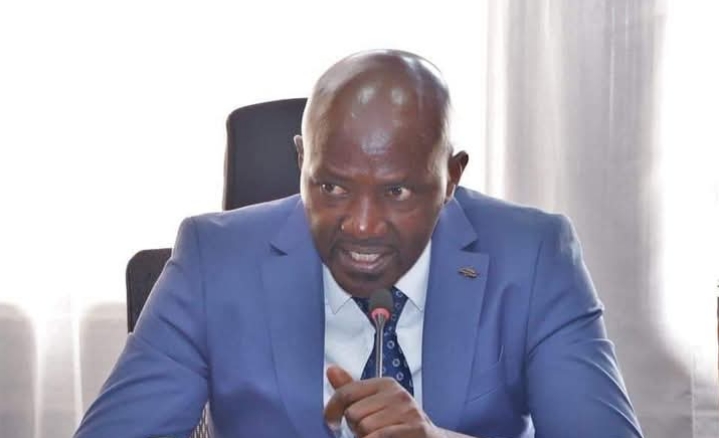KENYA : Murang'a Senator Joe Nyutu has poked holes into the Country's current leadership, likening President William Samoei Ruto's administration to that of the Late Former President Daniel Toroitich Arap Moi.
Speaking on December 31, 2024, Nyutu Opined that the Mt Kenya region Produces the Best President's for the East African Country, Citing the Likes of the Late First President Jomo Kenyatta, Late Former President Mwai Kibaki and retired President Uhuru Kenyatta.
" Why is it that when we have a president From Rift Valley, Kenyans experience the worst things? They destroy the economy and oppress the people? What is always the Problem with a President From that Region?" Senator Nyutu Quipped.
Additionally, the Murang'a Senator expressed discontent at President William Ruto's choice of a Deputy President following the impeachment of his ally, Rigathi Gachagua.
Senator Nyutu alleged that President Ruto is being loathed by the Kikuyu Community for appointing Kithure Kindiki, a meru, as the country's deputy to replace Gachagua, a Kikuyu, despite there being a number of Kikuyu leaders fit for the role.
The Murang'a Senator insisted that the Kikuyus are a chosen community, that cannot be replaced nor led by another tribe in the Mt Kenya region bloc.
"As Kikuyus, Our Biggest Problem with President Ruto is that he appointed Kindiki, a meru, over so many Kikuyus. There is no way a Meru or Embu can lead the Chosen Kikuyus" Said Nyutu.
President William Ruto is confronting numerous challenges, ranging from high cost of living to spiraling unemployment, denting the public’s perception about his government.
Two years after taking over the State House, the head of state, once a darling to many following his pre-election Campaign promises, has since lost the trust and faith Kenyans had in his administration.
Ruto's leadership has been loathed by many, Fuelled by Shady Public Private partnership deals, over taxation, Jobless Youths, Huge Payslips cuts, among others.
Several Leaders including Mumias East Member of Parliament (MP) Peter Salasya have advised President Ruto on the steps to take to quell disquiet within his government.
Speaking on December 29, 2024, in a video message, Salasya Opined that one of the reasons Ruto’s administration is being subjected to harsh criticism is failing to honour pre-election promises.
According to Salasya, the Second reason the Kenya-Kwanza administration is facing the wrath of Citizenry is failing to act on major issues affecting the common Mwananchi.
Additionally, the Vocal Legislator slammed Cabinet Secretaries (CSs) maintaining that they had failed to articulate issues affecting their dockets, making Ruto stand out as the only government mouthpiece.
Salasya urged the President to embark on service delivery and abandon making other promises that he could not honour, in order To turn around the tide in his favor.
“I want to ask you, the president, to abandon the internet, stop overpromising, and go to work, and these young people will respect you. In Kenya there is freedom, and that freedom must be exercised.” Salasya stated.
Salasya told President Ruto that he could only earn back the trust and respect from the young generation by delivering on his campaign pledges contrary to many leaders who are demanding for the respect of the Head of State.
According to a Research and Consulting Survey released on December 16, 2024, only one percent of Kenyans trust Ruto and the entire Executive.
The Nationwide Perception Study December 2024 shows that another 28 percent have moderate trust, 29 percent have little trust while the larger majority (37 %) has no trust at all in the President, the Deputy President, and the Cabinet.
The survey that was conducted through an opinion poll also showed that a paltry four percent did not know how they felt about the Executive.
Some of the reasons for the lack of trust in these governing institutions include the leaders’ failure to keep their promises, some of which they believe are unrealistic.
“The waning public trust in our institutions is a result of, one; over-promising and two; failure to fulfill those promises. I think the current leaders came into office with many promises. Some of them were realistic, some unrealistic,” said a respondent.
Asked what would restore their trust in the executive and other governing institutions, 50 percent of the respondents stated that strengthening anti-corruption measures would, while 22 percent indicated the appointment of qualified people to lead the institutions, and improving public service delivery.
Further, 34 percent of survey respondents cited the strengthening of institutions’ independence and 45 percent indicated improvement of transparency in elections as the top reforms to restore public trust in governance and democratic institutions.
According to the poll, Kenyans trust the media more than any other governance or democratic institution in the country. 15% of those polled trust the media fully.
Religious leaders who have been at loggerheads with the state are fully trusted by 7% and Civil Society Organizations at 4%.
The Judiciary, Police, The Senate, Opposition leaders and the Office of the Auditor General have a trust level of 2 percent.
The outcome was similar for other arms of the government. The Judiciary, for example, had two percent of people expressing a lot of trust in it. 34 percent expressed moderate trust; 27 percent expressed little trust while 30 percent had no trust in the Judiciary at all.
The survey covered all 47 counties with the Rift Valley region taking the highest sample and the NorthEastern region taking the least sample, it targeted persons who were 18 years old and above.
The quantitative survey had a target survey sample size of 2400 respondents and had a 97 percent response rate.
President William Ruto's administration rise to the top seat was backed by a Bottom - Up Economic Transformation Agenda, with the Hustler empowerment narrative appealing to many.
However, the head of state is now steering a Sinking Ship. A failing Transition from the old National Health Insurance Fund to the Social Health Authority marred by Outages is fuelling the heat on his administration.
President Ruto, Deputy President Kindiki and Leaders affiliated to his administration, have however Opined Otherwise, Calling for More Time.
President William Ruto has exuded confidence in his administration's ability to deliver, Vowing to Fulfill all the Kenya-Kwanza administration's Promises, however, few are convinced following his 'habitual' lies and Promises.
Kenyans, already struggling with economic pressure, unemployment and hiked fees in higher education Funding, face a uncertain future, as the government moves to broaden the tax base.
The Kenya National Bureau of Statistics (KNBS) reports that 20.16 million Kenyans lived in poverty in 2022, with 16 million unable to meet basic food needs and 3.6 million in extreme poverty.
The crisis particularly affects rural areas, where 11.4 million people face food poverty compared to 4.6 million in urban areas.
The situation reflects broader economic challenges beyond basic food prices, including escalating costs of protein-rich foods, rent, and transportation, coupled with negative real wage growth since 2020.
The impact is visible in reduced consumer spending, with empty malls, restaurants, and a 26% decline in VAT collection. While seasonal food prices have decreased, other production costs remain high, potentially threatening farmers' livelihoods.
The report indicates that about 4.36 million households (three in ten) are classified as poor, highlighting the extensive reach of the economic downturn.







